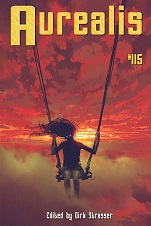“The Spoils” by Clive McAlpin
Reviewed by Victoria Silverwolf
A trio of stories dealing with death and loss appear in the latest issue of this Australian magazine.
In “The Spoils” by Clive McAlpin, a wealthy musician hires a tracker to locate a genetically modified animal. It ran off into an area of wilderness rendered deadly by an unspecified disaster. The region is full of mutated beasts, toxic fog, and other dangers. When the tracker finds the creature, he makes a decision that will change his life.
This story is imaginative and vividly written. Readers not familiar with Australian slang may find the narration difficult to follow.
“The Empty Quarter” by Jai Baidell takes place on another planet. Centuries ago, failed attempts at terraforming left a world covered with sand dunes. A scientist arrives to study the environment. After an accident leaves the scientist stranded, waiting for rescue, an unexpected discovery reveals the truth about what happened to the planet.
This is a short, simple story, which conveys its theme clearly. Its view of the nature of humanity is a pessimistic one.
“Sacrifice” by Pierce Skinner is a gruesome tale, with multiple disturbing elements. The protagonist is a strange, unpleasant fellow who enjoys cutting open containers of spoiled milk and letting their rotting contents spill over his skin. He receives telephone calls from an unknown person telling him he is going to meet his father, thought to be dead. This leads to surreal scenes of cosmic terrors, in the tradition of H. P. Lovecraft. A sex doll, purchased with money inherited from his dead mother, also plays an important role.
Like much horror fiction, this story sacrifices logic for mood. Some scenes, such as the detailed description of the man’s fetish for spoiled milk, have nothing to do with the plot, and seem intended only to shock.
Victoria Silverwolf notes that all three of these stories are narrated in first person, present tense.
 Aurealis #115, October 2018
Aurealis #115, October 2018